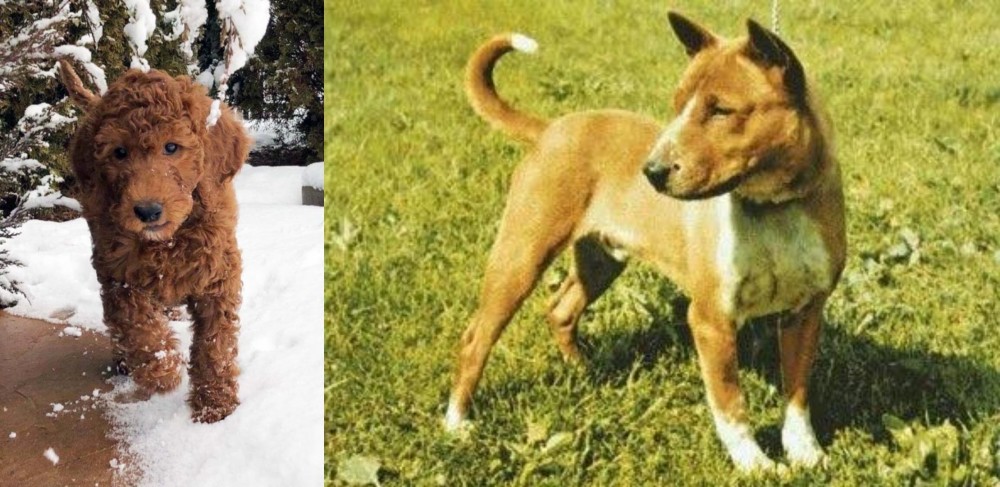 Petzlover
Petzlover Irish Doodles is originated from United States but Telomian is originated from Malaysia. Irish Doodles may grow 10 cm / 3 inches shorter than Telomian. Irish Doodles may weigh 18 kg / 40 pounds more than Telomian. Both Irish Doodles and Telomian has same life span. Irish Doodles may have more litter size than Telomian. Irish Doodles requires Low Maintenance. But Telomian requires Moderate Maintenance
Irish Doodles is originated from United States but Telomian is originated from Malaysia. Irish Doodles may grow 10 cm / 3 inches shorter than Telomian. Irish Doodles may weigh 18 kg / 40 pounds more than Telomian. Both Irish Doodles and Telomian has same life span. Irish Doodles may have more litter size than Telomian. Irish Doodles requires Low Maintenance. But Telomian requires Moderate Maintenance
 Known also as the Irish Doodle Setter or the Irish Setterdoodle, the Irish Doodle is a crossbreed – a mix of Irish Setter and Poodle.
Known also as the Irish Doodle Setter or the Irish Setterdoodle, the Irish Doodle is a crossbreed – a mix of Irish Setter and Poodle.
This designer crossbreed comes from the United States. There isn't much of a history with the Irish Doodle, though both breeds used to create this dog breed have their own long histories.
Because the Irish Doodle is a hybrid breed, it isn’t recognized by the American Kennel Club. It is however recognized by the American Canine Hybrid Club.
 The Telomian, out of Malaysia is rare and the only dog bred in Malaysia that lives outside the country. The breed was originally called Village dog or Anjing Kampung in Malay. The Telo is still considered one of the rarest dogs in the world. They are considered as a possible missing link between the Australian Dingo and the African Basenji.
The Telomian, out of Malaysia is rare and the only dog bred in Malaysia that lives outside the country. The breed was originally called Village dog or Anjing Kampung in Malay. The Telo is still considered one of the rarest dogs in the world. They are considered as a possible missing link between the Australian Dingo and the African Basenji.
They were bred to kill vermin by indigenous people, the Orang Asli of Malasia. They have an amazing ability to climb bred into them because these indigenous people lived in stilt houses. Even as they kept the Theomian to hunt vermian, the Orang Asli believed dogs were evil spirits who would eventually turn on them.
In 1963, Dr. Orville Elliot, an anthropologist from the West, discovered the breed and named them the Telomian for the Telom River they lived near. He took a pair to the United States and by 1970 there was a Telomian Dog Club in the U.S. By 1973 another pair had been imported and it is thought that all the Telomians who live in the United States today are descendants of these two pairs.
Like the New Guinea Singing Dog and the Basenji, the Telo do not bark but rather have a unique howl. Being bred from wild dogs, the Telo is not fully domesticate and puppies need a lot of socialization. The Telomian is on the Dog Registry of America Inc and America’s Pet Registry but is not recognized by any pedigree registry.
 The Irish Doodle is a medium sized dog, standing at roughly 33cm to 38cm and weighing roughly 18kg to 31kg.
The Irish Doodle is a medium sized dog, standing at roughly 33cm to 38cm and weighing roughly 18kg to 31kg.
Pet owners appreciate that a dog like this is considered to be hypoallergenic and this attractive aspect of this dog comes from the Poodle side. The Irish Doodle's coat is long, soft and fairly wavy with apricot being the most common coat color but other colors include white, cream, brown and black. The head and muzzle is longish, the eyes brown, the ears floppy and the tail long.
The Poodle and the Irish Setter combine to ensure that the Irish Doodle is an intelligent dog and that he has an amicable disposition so that he is good with kids and pets in the home.
He has a host of excellent characteristics that make him a superb family pet and these are friendliness, intelligence, devotion and loyalty. He is easy to train and training and socialization will make him obedient so that he responds well to simple instructions such as come, stay, lie down, sit etc.
 This is a somewhat unique looking breed. They are small dogs, sturdy, athletic dogs with short coat, a square body and a long back. Their coat is smooth and sable and the ticking is white. They often have black masks and purple tongues. They are about 15-18 inches in height and weigh about 18-28 pounds. Their head is well proportioned and they have erect ears, almond shaped eyes and deep chests.
This is a somewhat unique looking breed. They are small dogs, sturdy, athletic dogs with short coat, a square body and a long back. Their coat is smooth and sable and the ticking is white. They often have black masks and purple tongues. They are about 15-18 inches in height and weigh about 18-28 pounds. Their head is well proportioned and they have erect ears, almond shaped eyes and deep chests.
The Telo is still so undomesticated that the female only comes into estrus once a year in September to October. They have great command of their paws and can use them more like cats or racoons. They climb with them and hold toys, objects or food in them. This is related to their need to climb since homes were built on stilts in the jungles of Malaysia.
 The Irish Doodle is guaranteed to make you a great pet. Every dog becomes better when they have been trained and socialized as they require having interactions with other dogs and people to know how to behave around them later on.
The Irish Doodle is guaranteed to make you a great pet. Every dog becomes better when they have been trained and socialized as they require having interactions with other dogs and people to know how to behave around them later on.
The Irish Doodle is a playful, active, attractive, loyal, fun loving pet who will learn easily.
The most important thing to remember with your Irish Doodle is to get involved in his life. He didn’t ask to come to you, but if you do your part and treat him like a much loved family member, you’ll soon see that your life isn’t complete without a wonderful 4-legged friend like the Irish Doodle.
 2.Special talents – climbing ability, use of their paws, able to hunt their own food.
2.Special talents – climbing ability, use of their paws, able to hunt their own food.
3.Adaptability – they are not big so you would think apartment living would be ok but because of their energy and prey drive they really need a place to run.
 Irish Doodles are a robust, resilient breed, and with good care they can live to be 11, 12, 13 or 14 years. Nonetheless you need to know about the more common dog illnesses that any dog can develop.
Irish Doodles are a robust, resilient breed, and with good care they can live to be 11, 12, 13 or 14 years. Nonetheless you need to know about the more common dog illnesses that any dog can develop.
These are hip dysplasia, eye problems, ear infections, bloat and Von Willebrand's Disease.You can improve your dog’s health by making sure he gets the very best food there is to eat, a warm, dry place to sleep and that he is treated with lots of love and care.
Von Willebrand's disease is an inherited bleeding disorder. The disorder comes about because of a deficiency of von Willebrand Factor. This is an adhesive glyco-protein in the blood which is necessary for platelet binding or clotting. The condition can lead to excessive bleeding after an injury because the blood can’t clot.
 This is a somewhat unique looking breed. They are small dogs, sturdy, athletic dogs with short coat, a square body and a long back. Their coat is smooth and sable and the ticking is white. They often have black masks and purple tongues. They are about 15-18 inches in height and weigh about 18-28 pounds. Their head is well proportioned and they have erect ears, almond shaped eyes and deep chests.
This is a somewhat unique looking breed. They are small dogs, sturdy, athletic dogs with short coat, a square body and a long back. Their coat is smooth and sable and the ticking is white. They often have black masks and purple tongues. They are about 15-18 inches in height and weigh about 18-28 pounds. Their head is well proportioned and they have erect ears, almond shaped eyes and deep chests.
The Telo is still so undomesticated that the female only comes into estrus once a year in September to October. They have great command of their paws and can use them more like cats or racoons. They climb with them and hold toys, objects or food in them. This is related to their need to climb since homes were built on stilts in the jungles of Malaysia.
 Even though the Irish Doodle's coat is long, this is a dog with just about no shedding, so a brush once a week will ensure his coat stays in tip-top condition. Some Irish Doodle owners like to take their pet to have the coat professionally trimmed.
Even though the Irish Doodle's coat is long, this is a dog with just about no shedding, so a brush once a week will ensure his coat stays in tip-top condition. Some Irish Doodle owners like to take their pet to have the coat professionally trimmed.
The Irish Doodle isn’t one of these dogs where you need to ensure a good dose of exercise every day. He doesn’t particularly need a lot of exercise, so include him in your daily walks and give him a ball game now and then to keep him happy and fit.
As a medium sized dog, your Irish Doodle will require a high quality diet that will ensure he is getting all the right minerals and vitamins he needs for his activities.
If you choose one of the wet or dry commercially manufactured foods, make sure it is one of the best quality ones free from fillers, colorants and preservatives. It is to your pet’s benefit to add in some homemade food to his kibble such as cooked chicken, brown rice, pasta and vegetables.
Raw meat is expensive, but if you can, give him some raw meat occasionally too as this promotes bright eyes, a wet nose and a healthy skin and fur.
Fresh, cool water must be provided every day non-stop.
 This is an isolated, rare breed with very few known genetic health issues. They tend to be very healthy and athletic if well cared for and fed properly. The only issues they are known to have throughout the breed are hip and elbow dysplasia. Both of these issues we know can lead to arthritis and or lameness. Individual dogs may face other challenges such as allergies and obesity, but as a breed they are extremely healthy, much as the dingo and other wild dogs remain healthy.
This is an isolated, rare breed with very few known genetic health issues. They tend to be very healthy and athletic if well cared for and fed properly. The only issues they are known to have throughout the breed are hip and elbow dysplasia. Both of these issues we know can lead to arthritis and or lameness. Individual dogs may face other challenges such as allergies and obesity, but as a breed they are extremely healthy, much as the dingo and other wild dogs remain healthy.
Don’t overfeed them and watch what they might eat or try to eat when outside. They are used to feeding themselves in the wild and the domesticated dogs retain that prey drive and desire to eat what they catch.